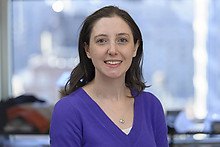This is the first in a series of profiles of GSA members who are establishing their first independent labs. If you’d like to be considered for a profile, please complete this form on the GSA website.
Krista Dobi
Assistant Professor, Natural Sciences Department
Baruch College, City University of New York
Research program:
My lab uses Drosophila as a model system to understand how muscle diversity is achieved throughout development. Like humans, fruit flies have muscles that differ from one another in properties like size, shape, innervation and attachment to tendons; these properties are important for each muscle’s specific function. During my postdoc, I conducted a screen for genes that were enriched in subsets of muscles with shared properties. From the screen, we confirmed and characterized several genes’ roles in muscle development. In my current position, I look forward to following up on some of these “hits” and providing a more in-depth analysis of their mechanisms.
“Whether it’s fly pushing or dissecting yeast tetrads, I love crossing things and analyzing the progeny. And I love teaching others how to cross things – that moment when all the abstract concepts they learned in the classroom all resolve into a clear understanding when they look at a set of replica plates or a pile of flies for the first time – that’s the best.” – Krista Dobi on her favorite parts of science
Role of GSA in your career:
The GSA has been so important for my career in a number of ways. As a DeLill Nasser Award recipient, I was able to attend a small, focused conference, where I had many opportunities to talk to other scientists about our field. The GSA-sponsored conferences – like the fly and yeast meetings I have attended – have been great places to learn about new technologies and resources for my model organism. I initiated a post-doc collaboration at one fly meeting, and am looking forward to taking advantage of the resources for educators now that I teach undergraduates. I served for two years on the GSA Board of Directors as a Junior Board Member representing post-docs, and it was a fantastic opportunity to serve the Genetics community, advocate for trainees and learn about what the GSA does beyond meetings. I think societies like the GSA are important because not only do they provide opportunities for scientists to network and share their data, but they also serve as a strong collective voice advocating for changes to grant and fellowship awards, lobbying for increased research funding, and providing ethical consideration and guidance for scientific research (e.g., publication of the HeLa cell genome as well as related essays in G3).
Previous training experiences:
- Undergraduate – Princeton University, Gavis Lab, Drosophila
- Graduate – Harvard University, Winston Lab, Saccharomyces cerevisiae
- Postdoc – Memorial Sloan Kettering Cancer Center, Baylies Lab, Drosophila
Teaching:
- Intro Bio (Fall 2015)
- Molecular and Cellular Biology (Spring 2016)
Interests outside of work:
Spending time at the shore and reading – mystery novels and science fiction, mostly.
| The views expressed in guest posts are those of the author and are not necessarily endorsed by the Genetics Society of America or its employees. |














